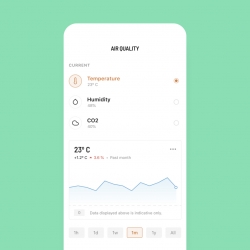To provide the best experiences, we use technologies like cookies to store and/or access device information. Consenting to these technologies will allow us to process data such as browsing behaviour or unique IDs on this site. Not consenting or withdrawing consent, may adversely affect certain features and functions.
The technical storage or access is strictly necessary for the legitimate purpose of enabling the use of a specific service explicitly requested by the subscriber or user, or for the sole purpose of carrying out the transmission of a communication over an electronic communications network.
The technical storage or access is necessary for the legitimate purpose of storing preferences that are not requested by the subscriber or user.
The technical storage or access that is used exclusively for statistical purposes.
The technical storage or access that is used exclusively for anonymous statistical purposes. Without a subpoena, voluntary compliance on the part of your Internet Service Provider, or additional records from a third party, information stored or retrieved for this purpose alone cannot usually be used to identify you.
The technical storage or access is required to create user profiles to send advertising, or to track the user on a website or across several websites for similar marketing purposes.
 A survey of real estate and IT professionals across a range of industries claims that better remote working technology is perceived to be twice as important as workplace testing. Workplace creation specialists Unispace surveyed over 2,000 senior Real Estate and IT professionals across Europe on the topic of the future of work, and what to expect from the workplace of the near future. (more…)
A survey of real estate and IT professionals across a range of industries claims that better remote working technology is perceived to be twice as important as workplace testing. Workplace creation specialists Unispace surveyed over 2,000 senior Real Estate and IT professionals across Europe on the topic of the future of work, and what to expect from the workplace of the near future. (more…)








 When the global pandemic struck last year, many companies were forced to close offices and enable employees to work remotely – bringing forward their digital transformation roadmap by a good few year. A year on, and while it seems that the Covid-19 restrictions are reducing, there is unlikely to be a complete shift back to the office. Instead, most companies are now planning to adopt a hybrid work model; with employees working a mix of in-office or remotely.
When the global pandemic struck last year, many companies were forced to close offices and enable employees to work remotely – bringing forward their digital transformation roadmap by a good few year. A year on, and while it seems that the Covid-19 restrictions are reducing, there is unlikely to be a complete shift back to the office. Instead, most companies are now planning to adopt a hybrid work model; with employees working a mix of in-office or remotely. 
 The COVID-19 pandemic has led to a surge in digital learning with seven in ten organisations (70 percent) reporting an increase in use of digital or online solutions over the last year, according to the latest Learning and Skills at Work report from the
The COVID-19 pandemic has led to a surge in digital learning with seven in ten organisations (70 percent) reporting an increase in use of digital or online solutions over the last year, according to the latest Learning and Skills at Work report from the 
 Jooxter has announced the expansion of its operations into the UK and Ireland.
Jooxter has announced the expansion of its operations into the UK and Ireland. 
 Spaceflow, a tenant experience operating system and Flowbox, an in-building advanced technology management company, announce their partnership. Through their common product offering, Flowbox and Spaceflow help landlords and building operators with their ESG (Environmental, Social and Governance) goals. With FLOW, real estate companies can monitor energy consumption, occupancy, air quality, temperature, CO2 levels, humidity and in later phases, control and automate their building hardware in one platform. Real-time data helps owners and managers optimize operations, streamline the use of energy sources, reduce operating costs and be guided through investment decisions.
Spaceflow, a tenant experience operating system and Flowbox, an in-building advanced technology management company, announce their partnership. Through their common product offering, Flowbox and Spaceflow help landlords and building operators with their ESG (Environmental, Social and Governance) goals. With FLOW, real estate companies can monitor energy consumption, occupancy, air quality, temperature, CO2 levels, humidity and in later phases, control and automate their building hardware in one platform. Real-time data helps owners and managers optimize operations, streamline the use of energy sources, reduce operating costs and be guided through investment decisions. 
 The workspace innovator
The workspace innovator 
 The European Commission recently announced its proposal for the regulation of artificial intelligence, looking to
The European Commission recently announced its proposal for the regulation of artificial intelligence, looking to 
 New research by
New research by 
 Central to any business is the need to communicate effectively. Whether you’re relocating to new or refurbished premises, or switching providers, it is vital to ensure your communications networks are up to the job in terms of performance and reliability. Not only is this required to support conventional telecoms and OTT services, it is key to smart building and smart infrastructure applications. Connectivity should not be limited to Wi-Fi either. Businesses are increasingly pushing mobile-only strategies and landlines are fast becoming obsolete in the workplace.
Central to any business is the need to communicate effectively. Whether you’re relocating to new or refurbished premises, or switching providers, it is vital to ensure your communications networks are up to the job in terms of performance and reliability. Not only is this required to support conventional telecoms and OTT services, it is key to smart building and smart infrastructure applications. Connectivity should not be limited to Wi-Fi either. Businesses are increasingly pushing mobile-only strategies and landlines are fast becoming obsolete in the workplace. 
 Businesses are managing a new work dynamic that’s made up of three parts, or three ‘types’ of employee. Some are keen to go back to the office, some want to stay working from home, and some want an entirely flexible arrangement so they can fit work around important personal commitments.
Businesses are managing a new work dynamic that’s made up of three parts, or three ‘types’ of employee. Some are keen to go back to the office, some want to stay working from home, and some want an entirely flexible arrangement so they can fit work around important personal commitments. 








June 1, 2021
Real Estate, HR and Technology leaders must collaborate to create a future of work fit for the 21st Century
by Philip Nye • Comment, Property, Technology, Workplace, Workplace design